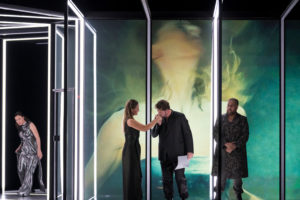 Mozart’s penultimate opera – completed in 1791 while he was composing Die Zauberflöte – is Opera seria, historical drama, based loosely in Roman times. The plot shows how the new Emperor Tito tries to serve his people, but is thwarted by political rivals, and betrayed by his best friend Sesto. (Tito sacrifices his Jewish lover Berenice for a Roman, and is prepared to marry Sesto’s sister Servilia.) But Vitellia, daughter of the deposed Emperor, joins a plot against Tito. The plot aborts, and in a twist, Tito survives and turns the tables.
Mozart’s penultimate opera – completed in 1791 while he was composing Die Zauberflöte – is Opera seria, historical drama, based loosely in Roman times. The plot shows how the new Emperor Tito tries to serve his people, but is thwarted by political rivals, and betrayed by his best friend Sesto. (Tito sacrifices his Jewish lover Berenice for a Roman, and is prepared to marry Sesto’s sister Servilia.) But Vitellia, daughter of the deposed Emperor, joins a plot against Tito. The plot aborts, and in a twist, Tito survives and turns the tables.
So how does a modern production present this ‘historical’ stuff without casting the players in Roman togas, and using kitsch roman statues. Well, at least Vienna’s Theater an der Wien’s new production (director Sam Brown) starts with the advantage of a ‘period instrument’ orchestra, Concentus Musicus Wien (conductor Stefan Gottfried), to justify Mozart’s score with some authenticity.
But the ultra slick metallic aluminium frames? Are we in for a fashion show of cutting-edge evening wear. Where’s the hint of a ‘classical’ narrative? And we haven’t mentioned the brilliant, jewel colours of the lighting (Jean Kalman.) In fact, the often sensational special effects (video Tabea Rothfuchs), may seem superficial, but do not detract from, and sometimes enhance, the narrative.
So the giant blow-up of Tito (Jeremy Ovenden), background to the overture, seems to come alive. His eyes move, then his hands feel, fingers probe his face, as if to reassure himself – now Emperor- that he’s still human.
Vitellia (Nicole Chevalier), is using Sesto (David Hansen)- they’re having sex, her legs raised, his back to us- manipulating him in her bid for power. Chevalier’s soprano is at full throttle, she, like a goddess, wearing a lustrous metallic copper gown. In her aria, Come ti piace imponi, when you want to please me, follow me with blind trust. She wants Tito, dead before sunset. He’s robbed her of her Kingdom. –  He, Order me what you will; you’re my destiny!
He, Order me what you will; you’re my destiny!
Hansen’s counter-tenor was beautifully sung. Yet dramatically – against Vitellia’s full-blooded passionate woman- his counter-tenor didn’t make sense, seemed strange. Nevertheless this is traditionally, a cross-dressed role, (Elina Garanca sang it, Vienna State Opera 2012, as a mezzo.)
Annio (Kangmin Justin Kim, another counter-tenor, higher than Hansen’s), has come to announce Berenice’s dismissal, and ask his friend Sesto permission to marry his sister Servilia. Justin is surprisingly feminine in a shiny, lustrous black suit, his counter-tenor is so high-pitched that I at first wondered…Anyway, it isn’t about gender, but rather about maintaining the dramatic balance of the piece.
Rome’s nobility gather on the capitol for Tito’s coronation. In what appear to be pavilions, on the rotating stage the people are seen through glass partitioning. Ovenden’s Tito sings impressively, announcing his agenda as benevolent ruler, (promising to help the victims of the latest Vesuvius eruption.) ‘The sole desire of the Sovereign is to do good: the rest is torment and solitude’, he sings. And announces, out of friendship to Sesto, he will marry Sesto’s sister Servilia as Empress. Thus Tito’s rule being about virtue and friendship, Servilia will bring them closer. Symbolically, Tito kisses Sesto; (or is there more to it.) Ovenden a ‘leading Mozart tenor of his generation’, yet here his tenor lacked suppleness.
Annio tells his bride Servilia (Mari Eriksmoen) she’s been chosen to be Tito’s wife. But she refuses, and goes to Tito confessing her love for Annio. ‘Love is the only thing that matters in this life,’sings Eriksmoen’s soprano with passionate conviction. Tito, deeply moved, will help the two lovers. His renunciation of his marriage to Servilia, is an example of his generous spirit. Yet his very humanity, tragically misunderstood for weakness, he’s plotted against.
 Vitellia, hearing about Servilia, and furious with Tito, taunts Sesto. She was just beginning to love him…Look at me! Enough, he’ll do it, he will avenge her. Don’t forget me, think of my yearning! Sesto’s aria, Parto, parto, sung by Hansen to sublime clarinet accompaniment, is a cascade of coloratura, a tour-de-force. Yet Sesto, hardly set out, now hears about Tito’s new plan to make Vitellia his wife, and offer her the crown. Chevalier is sensational singing of her accursed rage, ‘this great joy: yet gods I am frozen with fright!’
Vitellia, hearing about Servilia, and furious with Tito, taunts Sesto. She was just beginning to love him…Look at me! Enough, he’ll do it, he will avenge her. Don’t forget me, think of my yearning! Sesto’s aria, Parto, parto, sung by Hansen to sublime clarinet accompaniment, is a cascade of coloratura, a tour-de-force. Yet Sesto, hardly set out, now hears about Tito’s new plan to make Vitellia his wife, and offer her the crown. Chevalier is sensational singing of her accursed rage, ‘this great joy: yet gods I am frozen with fright!’
The plot is to set fire to he Capitol, then kill Tito. The fire is graphically suggested by frantic crowds seen running through the smoke-filled glass pavilions. Annio doesn’t have the heart to carry out Vitellia’s deed. Preserve the glory of Rome, or let me perish with it, he sings.
In Act 2, Annio sees Sesto, who’s now desperate because the Emperor is unharmed: someone else was stabbed. But two counter-tenors together in one scene makes dramatic nonsense. They get up very close, Hansen’s Sesto with Justin Kim’s Annio (his brother-in-law.) Sesto confesses his complicity. But against Vitellia’s command to flee, Annio implores: Don’t go! Go back to Tito and trust in his clemency.(You have been betrayed, Tito’s heart is compassionate.) Publio, bass-baritone Jonathan Lemalu, who adds ballast and authority to the cast, orders Sesto arrested, and insists he be executed. He sings of Tito, one who’s never known disloyalty will be slow to recognise betrayal.
But against Vitellia’s command to flee, Annio implores: Don’t go! Go back to Tito and trust in his clemency.(You have been betrayed, Tito’s heart is compassionate.) Publio, bass-baritone Jonathan Lemalu, who adds ballast and authority to the cast, orders Sesto arrested, and insists he be executed. He sings of Tito, one who’s never known disloyalty will be slow to recognise betrayal.
In Tito’s aria, the Fate of the ruler is not enviable, Ovenden is at first enraged, the villain must die. But what if… He’s torn between rage and friendship, (in his aria Che orror! Che tradimento!) The Senate has condemned Sesto to death, but Tito will first see the friend who’s betrayed him. (He’s guilty, but how will future generations judge us?) Sesto, however, who won’t admit Vitellia’s guilt and complicity in the plot, is prepared to die. Yet the way it’s enacted by Ovenden’s and Hansen’s Sesto, they’re intimate and physical. This should be about virtue, treachery and betrayal, not a gay lover’s tiff. Sam Brown’s production hints at a ‘queer’ subtext. But this erotic aspect, speculating on Tito’s sexuality, detracts from Tito’s readiness to sacrifice all for his country.
Vitellia finally saves Sesto; time for her to prove her character. Ecco il punto …non più di fiori, Chevalier poignantly sung to basset horn. Vitellia throws herself at Tito’s feet, admitting it was she – neglected by him- who sought revenge. Chevalier’s aria pulls out all the stops.
The metal frame sets are now gold. Tito centre-stage, people in pavilions either side, (Arnold Schoenberg Choir), sing Tito’s praises . No wonder the gods protect him. However, Tito’s aria is poignant and powerful. ‘When will he find a faithful soul… History shows loyalty means nothing if it’s through fear and not love. And we see Ovenden, side of stage, an isolated figure, re-affirming, (Tu è ver, massolvi augusto), ‘Rome’s happiness is his supreme aspiration.’
The star cast was not ideal, but the set and costumes though effective, problematically high-tech for a historically classical piece. Paradoxically, Concentus Musicus Wien revealed Mozart’s miraculously inventive score on original instruments, like restoring an old masterpiece. © 24.10. 2019
Photos: Nicole Chevalier as Vitellia; David Hansen as Sesto; Nicole Chevalier, Mari Eriksmoen (Servilia), Jeremy Ovenden (Tito), Jonathan Lemalu (Publio); David Hansen (Sesto), Kangmin Justin Kim (Annio); Featured image:Jeremy Ovenden, Arnold Schoenberg Choir
© Werner Kmetitsch
